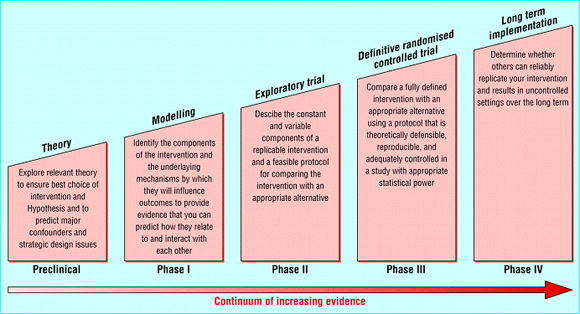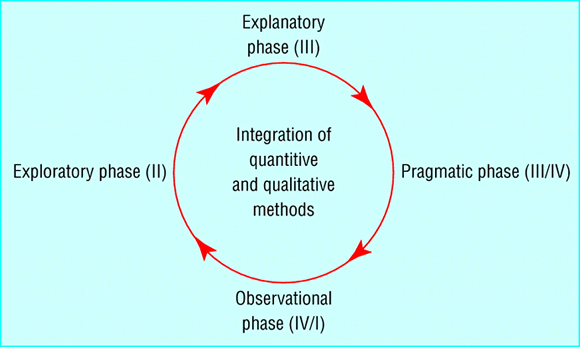Sasha Shepperd
Download: Presentation (PDF, 460KB)
Overview of the chapter structure:
This chapter is divided into the following sections:
- A framework for evaluating complex interventions
- Knowledge translation, complex interventions and the iterative loop
- Future research
Key Learning Points
- The active ingredient(s) of complex interventions can be difficult to identify
- Stakeholders can inform trialists on which element(s) of a complex intervention are essential to reproduce
- Other types of evidence can improve the relevance of trials for policy makers
- The MRC Framework for the Development and Evaluation of Randomised Controlled Trials for Complex Interventions to Improve Health1 provides a mechanism for formally integrating other types of evidence and may support the transfer of evidence based interventions
- External validity can be strengthened through the involvement of key health care decision makers
A Framework for Evaluating Complex Interventions
The MRC Framework provides an iterative step wise approach to determine the state of knowledge about a complex intervention
MRC Framework for Evaluating Complex Interventions
-
Step 1 Defining the intervention
- Identify the existing evidence and any theoretical basis for the intervention in order to describe the components of the intervention
-
Step 2 An exploratory phase
- Assess the acceptability and feasibility of delivering the intervention, and the comparison intervention
- Pilot the study design
-
Step 3 An explanatory phase
- The final trial design is implemented in a relevant setting with appropriate eligibility criteria
-
Step 4 A pragmatic phase
- Implementation and fidelity are examined
- Key to KT


Knowledge Translation, Complex Interventions and the Iterative Loop
- Involve decision makers in shaping the research question and defining the intervention
- Systematically identify and integrate additional forms of evidence relevant to decision makers
- Measure outcome and process variables relevant to KT
- Measure degree the intervention has been sustained outside a research setting
- Be aware of a changing political context
Areas for Future Research
- Generate empirical evidence to assess the benefits of involving stakeholders, in the design phase of research, on subsequent implementation
- Research describing the iterative process, how key decision makers are identified and contribute to decision making
1Campbell M, Fitzpatrick R, Haines A, Kinmouth A-L, Sandercock P, Spiegelhalter D. A framework for development and evaluation of RCTs for complex interventions to improve health. BMJ 2000;321:694-6.

